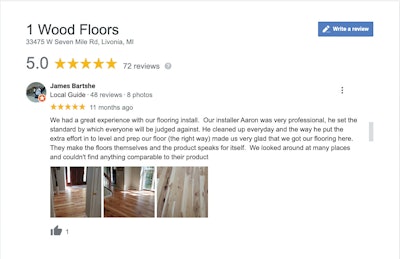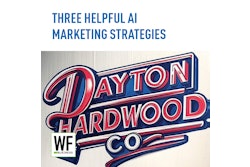
There’s no shortage of online review sites these days, but I have found that Google reviews play a much more important role than a lot of other outlets. Google leads right to our business page and is really the way most people find us online. So when we ask for a review, we send a link specifically for Google. Having excellent Google reviews has been a great help for generating business, but it’s also a balancing act that requires strategy. Here’s how I encourage clients to leave positive Google reviews and how that process has helped strengthen our company.
We carefully inspect every job
Obviously, when it comes to getting good reviews, excellent service at every level of the project comes first. But no matter how happy the client seems at the end of a job, we do a thorough job-site inspection before we send a review link. When we give them a care-and-maintenance package and walk them through the dos and don’ts, we also gauge our quality on that job and how that resonated with that customer. If everything goes really well on that inspection, then we’re done and we email the review link. But if there are any issues that arise, whether it’s something the customer brought up or something we discovered ourselves, now we can correct that issue. We won’t send a review link out until we feel we have done 100% all the way through the project.
We’re selective about who we ask
Even if you’ve done a five-star job, there are certain people who just don’t believe in giving a five-star review. A lower-star rating could come across as though you did something wrong even though you didn’t. So before we send a review link, we screen the clients, and that is kind of our secret sauce.
If we don’t get a review, we ask ourselves why
We’ve found people are more uncomfortable leaving a bad review than they are with a good review. So if you don’t get a review, that may tell you that something didn’t go exactly the way it should have. We are trying to make the kind of impression where a client feels comfortable giving us a great review. So if we didn’t get a review, we find there may be something for us to improve upon. This kind of reflection always helps us improve our process.
We keep detailed communication records
Every time we communicate with a customer, we record it in our CRM management system. If we didn’t get a review, this helps us go back over the timeline and the notes to try to find out if something went wrong. It’s also helpful on those rare occasions when you get an unfairly negative review. In one instance, someone who left a two-star review for us wanted a phone call back quicker than he got it. But through our management system, we have a record of when his call came in and when we returned it. So we can go back there and say, “Hey, here’s when your email came through and here’s when we reached out to you.” Keeping track of your records with people helps straighten out those situations relatively quickly.
We’re diligent with followup emails
Sometimes the lack of a review is just a matter of the customer not having time that day or forgetting. We make a point of following up with customers ahead of seasonal changes to remind them of the temperature and humidity in their homes (we’re in Michigan, where those fluctuations can be dramatic). We use that as an opportunity to keep communication open. If they haven’t left us a review yet, we’ll throw in a little reminder and a link. Communication after the project is over is helpful, and we get a couple reviews just based on those followups. Everything is relationship-based, and it’s our job to keep that relationship going with the customer.
We treat reviews like word-of-mouth
I’ve been in this trade for 26 years, and when I started, word-of-mouth was the strongest form of referral and the strongest compliment. The emphasis we put on word-of-mouth back then is the same emphasis we now put on our Google reviews. It’s our reputation, so my advice is to work on a company strategy to make sure your customers are more than willing to leave those five-star reviews.































